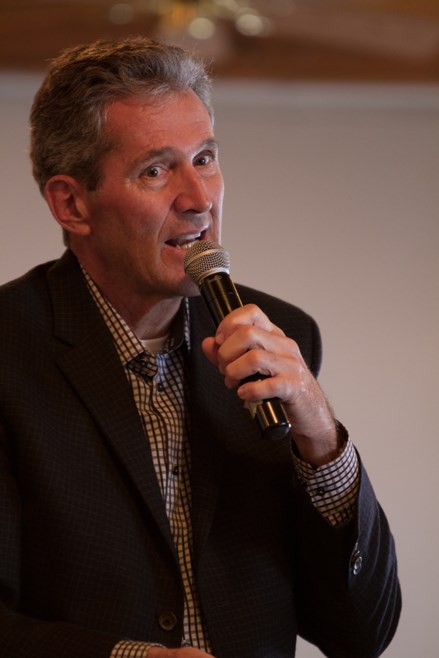The 2016 Manitoba provincial election officially kicked off last week, and Progressive Conservative leader Brian Pallister swung by Thompson’s Juniper Centre for a brief meet-and-greet with local MLA candidate Kelly Bindle March 19.
Pallister’s presentation, in many respects, was somewhat vague in the intentions it promised; Pallister disclaimed his broad strokes, noting “I’m not about making promises; I’m about keeping them.” But Pallister was clear on his main priority: reducing Manitoba’s provincial debt. Speaking to the NDP’s economic strategy, he stated, “What we have in Manitoba here is the six-million-dollar man: every day since Greg Selinger has been the premier of Manitoba, he has spent six million dollars more than he has brought in, with some of the country’s highest tax rates. Now, I’m not about cuts, but what I am about is getting a handle on this crazy, runaway debt train.”
Seeing as the meet-and-greet was hosted in the Juniper Centre, disability issues were a popular question among attendants, and many questions were fielded asking what a PC government would do for accessibility in Manitoba. Pallister acknowledged these concerns, and while he noted he felt underequipped to answer these questions, he did cite his own experiences with caring for family with disabilities. Once again, he brought the issue back to bureaucracy, and a need to streamline Manitoba’s healthcare process: “We spend more in Manitoba per person under the NDP on healthcare than every other province, and we get less for it. They’ve built up the bureaucracy at the top to the biggest in Canada, and the services that should be there for people like you, at the front line, aren’t there, because there’s so much bureaucracy and red tape in the system.”
It was here Pallister made his sole commitment for the afternoon, to conduct a performance review of government institutions across the province, including regional health authorities. He cited the increased hiring of healthcare communications staff, an investment Pallister sees as misguided. “If you need a nurse or a doctor, you don’t want to get a communicator.”
Kris Blake, chairperson of People First in Thompson, also expressed concern for the Manitoba Developmental Centre, a residential care facility for adults living with intellectual disabilities that has been undergoing plans to phase out the outdated facility. Blake wanted assurance that a plan would continue to be in place to accommodate the remaining residents of the facility.
“In the old days, the way we handled intellectual disabilities is that we institutionalized everybody,” said Pallister. “It was the wrong way to do it, and we’re getting away from that now. But the first thing that the PC party advocated for when I took power was that we advocated for a better housing allowance for those living with disability. The government has said they would proceed. But that housing allowance hasn’t been raised in 15 years.”
Local defence lawyer Serena Puranen put forward the suggestion to Pallister that Thompson would strongly benefit from a provincial justice facility, in keeping with Thompson’s aspirations to host a northern restorative justice centre. But while Pallister was open to the idea, his reply was a surprising one for a leader who identifies as a conservative, emphasizing the need for advocacy and support groups to prevent crime, rather than punish it: “Other countries are doing far better than us in reducing youth crime and recidivism. I’m not saying we don’t need more facilities. But what I am saying is, wouldn’t it be better if we worked with these young people, and got them to make the right choices?”
Indeed, outreach to youth seemed to be a priority in Pallister’s action plan. When asked what Manitoba’s most underutilized resource was, he replied: “I would have to say our young people. Our young people are dropping out of school; the federal government is under-investing in on-reserve education, and I’ve been advocating for over a decade of my life for better investments to be made in education on-reserve. If you don’t train your people, you’re losing potential every day.”
Part of improving education among First Nations, he believes, is creating more social and cultural supports for students leaving their communities for the first time: “I went to Brandon University, where we had a teacher training program; indigenous kids would come, friends of mine, and they would drop out within the first year, because they were shocked. We’re talking smart people here, lots of potential. But the lifestyle was so different.”
“There’s nothing wrong with Manitoba that can’t be fixed by what’s right in Manitoba: we have the best people in the world right here in our beautiful part of the world,” Pallister said. “This is our chance: let’s get Kelly into the legislature, let’s get change in this government, and let’s make a better future for this province.”
Shortly after the PC leader’s northern visit, which included stops in The Pas and Flin Flon prior to dropping into Thompson, an NDP press release rebuked Pallister’s claims: “His plan for half a billion dollars in risky cuts will mean laying off nurses, doctors, teachers and police officers in Northern Manitoba. He said on the first day of the campaign that there are ‘no sacred cows’ when it comes to his cuts, meaning services northern families count on aren’t safe from his scissors. We’ve made investments in the University College of the North to help Northern Manitobans get local training for high-skilled good jobs and our commitment to tourism is well known, including supporting the Manitoba Chamber of Commerce’s call to increase funding for this important job-creating sector.”




